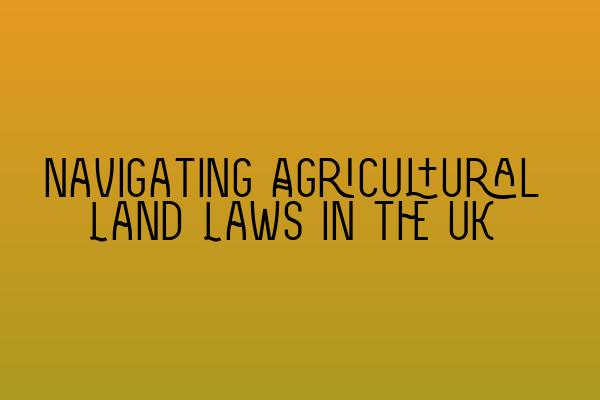Navigating Agricultural Land Laws in the UK
Welcome to SQE Property Law & Land Law, where we specialize in providing expert advice and assistance on all matters related to agricultural land laws in the UK. Whether you are a farmer, landowner, or someone interested in investing in agricultural property, it is essential to understand the legal framework surrounding agricultural land. In this article, we will explore the key aspects of agricultural land laws in the UK and provide valuable insights to help you navigate this complex area.
1. Understanding the Basics
When it comes to agricultural land, there are various legal considerations that need to be taken into account. These include tenure, planning regulations, environmental laws, and rights of way, among others. It is crucial to familiarize yourself with these fundamental aspects before embarking on any activities related to agricultural land.
2. Tenure and Ownership
One of the first things to understand is the different types of tenure in agricultural land ownership. These may include freehold, leasehold, and tenancies. The type of tenure you hold will determine your rights and obligations as a landowner, as well as the duration and terms of your ownership. For a detailed understanding of tenure in agricultural land, refer to our article on Magistrates’ Court vs Crown Court: Understanding Key Differences.
3. Planning Regulations
When it comes to agricultural land, planning regulations play a significant role. The UK has specific rules and regulations governing the use of agricultural land for different purposes, such as farming, development, or conservation. Understanding these regulations is essential to ensure compliance and avoid potential legal issues. Learn more about planning regulations in our article on Unraveling the Complexities of UK Bail Laws.
4. Environmental Laws
Agricultural land is subject to various environmental laws and regulations aimed at protecting the environment and natural resources. These laws encompass areas such as water management, soil and air quality, conservation, and biodiversity. Familiarizing yourself with these regulations is crucial to operating within the legal framework. For a deeper dive into environmental laws, refer to our article on Remand in Custody: Understanding Detention Prior to Trial.
5. Rights of Way and Boundaries
Rights of way are often a contentious issue when it comes to agricultural land. Understanding your rights and obligations regarding public and private rights of way is crucial to avoid disputes with neighboring landowners or the public. Additionally, clearly demarcating boundaries and resolving any disputes related to land boundaries is vital in maintaining a harmonious relationship with adjacent landowners. Learn more about rights of way and boundaries in our article on Appeals in Criminal Law: A Roadmap to Seeking Justice.
6. Grants and Subsidies
The UK government offers grants and subsidies to support agricultural practices that benefit the environment, rural economies, and food production. Understanding the availability, eligibility criteria, and application process for these grants and subsidies can be highly advantageous for farmers and landowners. Consult our article on Exclusion of Evidence: Understanding Grounds and Implications for more information on grants and subsidies.
7. Professional Advice and Assistance
Navigating agricultural land laws can be challenging, especially for individuals without legal expertise. Engaging the services of a professional solicitor with expertise in property law and land law can provide valuable guidance and ensure compliance with all legal requirements. At SQE Property Law & Land Law, our team of experienced solicitors is ready to assist you with any legal matters concerning agricultural land.
In conclusion, understanding agricultural land laws in the UK is essential for anyone involved in the agricultural sector. By familiarizing yourself with the basics, seeking professional advice when needed, and staying up to date with any changes in legislation, you can navigate the legal complexities and ensure the success of your endeavors. For comprehensive legal assistance, contact SQE Property Law & Land Law today.
Disclaimer: The information provided in this article is for general informational purposes only and cannot be considered as legal advice. For specific legal advice tailored to your situation, consult with a qualified solicitor.
